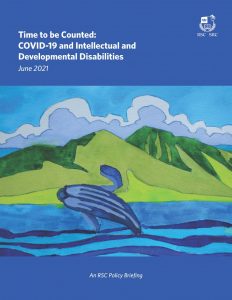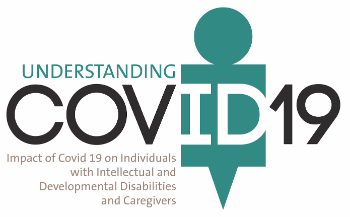CIIC Responds to the Covid-19 Global Pandemic
Covid-19 has impacted our world in so many ways. Unfortunately it has hit the most vulnerable people hardest, including people with intellectual and developmental disabilities and their families. The CIIC was quick to respond in a variety of ways to help mitigate the impacts and learn lessons for the future. Below are some of the ways we contributed to, and continue to respond to this global crisis.
Research Projects
 Time to be Counted: COVID-19 and Intellectual and Developmental Disabilities
Time to be Counted: COVID-19 and Intellectual and Developmental Disabilities
Established by the President of the Royal Society of Canada in April 2020, the RSC Task Force on COVID-19 was mandated to provide evidence-informed perspectives on major societal challenges in response to and recovery from COVID-19.
The Task Force established a series of Working Groups to rapidly develop Policy Briefings, with the objective of supporting policy makers with evidence to inform their decisions.
Full Report
Executive Summary
Accessible Version
Overview of Time to be Counted: COVID-19 and Intellectual and Developmental Disabilities
The COVID-19 pandemic has impacted the lives and well-being of all people globally, with consequences being observed across all domains from physical and mental health to education and employment outcomes, to access to community supports and services. However, the disproportionate impact of the COVID-19 pandemic and its associated public health restrictions on individuals with intellectual and developmental disabilities (IDD) has largely been overlooked. Not only do people with IDD have a greater risk of severe complications and death from the virus as shown in large scale studies, but they also face significant short- and long-term consequences of COVID-related public health measures on their mental health and well-being.
COVID-19 IDD: A global survey exploring family members’ and paid staff’s perceptions of the impact of COVID-19 on individuals with intellectual and developmental disabilities and their caregivers.
 Evidence suggests that people with intellectual and developmental disabilities experience disparities in healthcare access and utilization. This disparity was evident early in the pandemic when discussions arose regarding the potential exclusion of this population to critical care.
Evidence suggests that people with intellectual and developmental disabilities experience disparities in healthcare access and utilization. This disparity was evident early in the pandemic when discussions arose regarding the potential exclusion of this population to critical care.
Drs Baumbusch and Stainton were pleased to be the Canadian leads for this international study including 19 countries. The survey collected over 5000 results overall and close to 600 responses were gathered in Canada, the 3rd largest response rate of the 19 countries. Study findings will be prepared in a number of formats in order to meet the needs of different audiences. Outputs will include academic papers, lessons learned paper, practice guidelines, reports, infographics and video content. These outputs will be directed to families, frontline and management delivering disability services, national-level policy makers, healthcare quality and delivery authorities, national pandemic organizations and international bodies.
The research protocol can be found here: Linehan C, Araten-Bergam T, Baumbusch J, Stainton, T et al. (2021) COVID-19 IDD: A global survey exploring family members’ and paid staff’s perceptions of the impact of COVID-19 on individuals with intellectual and developmental disabilities and their caregivers.. HRB Open Res 2020, 3:39 (https://doi.org/10.12688/hrbopenres.13077.2
The Impact of COVID-19 on BC’s Children with Medical Complexity and their Families
Dr. Jennifer Baumbusch has shared the results of her survey about the impact of COVID-19 and associated restrictions on medically-complex children and their families in British Columbia. You can download a copy of the full report here: https://spice.nursing.ubc.ca/outreach/.
A two-page infographic with some of the key information and recommendations is also available.
The results of the survey show that families are experiencing difficulties across multiple areas: healthcare usage (including access to medical specialists and therapies), education, and social services. The impact on parents/guardians is clear: over half of the respondents indicated that their physical and mental health have declined over the past year. The recommendations target ways to address these wide-ranging issues.
Please share this report widely. A recent CIHI report indicated that just under one percent of children are medically-complex. Families rely on leaders such as yourselves to help amplify their situation – a situation that was precarious before the pandemic and has now worsened.
COVID-19: Understanding the Impact of COVID-19 on Inclusive Education for Students with Disabilities in British Columbia’s Public Education (K-12) System
Principal Investigator: Jennifer Baumbusch
The overall goals of this project are to:
- understand the impact of COVID-19 on inclusive education for students with disabilities and complex learners in British Columbia’s (BC) public education (K-12) system, and
- use this new knowledge to inform advocacy activities during subsequent waves of the pandemic, including informing hybrid models across online and in-person learning modalities to provide inclusive education.
Understanding the Impact of Covid-19 on Parents Caring for Children and Youth with Medical Complexity
Principal Investigator: Jennifer Baumbusch
For the first time in living memory, there is a global pandemic — COVID-19 — that affects the entire population. Within this context, the vulnerability of certain groups is amplified, including children and youth with medical complexity. The health, education, and social lives of these children and youth, and by extension their families, are shaped by a complex system of federal, provincial and local policies. In a rapidly evolving pandemic situation, the needs of this population are at risk of being ignored, or worse, their rights being eroded. In this study, we will conduct an interpretive policy analysis examining parents’ experiencing of caring for a child with medical complexity at this time. Findings from this study will generate a contextualized account of families’ experiences, which can help inform policies and related supports.
This study employs interpretive policy analysis, an approach that examines the impact of policies on the everyday lives of people, in this case, families that include a child or youth with medical complexity. The setting for the research is British Columbia. Parents/guardians of medically complex child and youth are invited to complete a 30-minute online survey. A subset of these participants will take part in semi-structured interviews to gain greater insight into their experiences.
A Rapid Review of the Impacts of COVID-19 on BIPOC with Disabilities and their Networks
A CIIC project undertaken by UBC Social Work student interns Ramona Sharma, Clayton Marsh and Brett Mason supervised by Rachelle Hole and Tim Stainton. Available on the CIIC website in Summer 2022.
Publications
- Baumbusch, J.L., Lamden-Bennett, S.R., & Lloyd, J.E.V. (2020). The Impact of COVID-19 on British Columbia’s Children with Medical Complexity and their Families. Vancouver, BC: University of British Columbia. Available at:https://open.library.ubc.ca/cIRcle/collections/facultyresearchandpublications/52383/items/1.0395118
- Hole, R. & Stainton, T. (Nov. 2020). Covid 19: The precarity of families & Disability. Child and Youth Services, 3. DOI: 10.1080/0145935X.2020.1834997
- Linehan C, Araten-Bergam T, Baumbusch J, Stainton, T. et al. (2020) COVID-19 IDD: A global survey exploring family members’ and paid staff’s perceptions of the impact of COVID-19 on individuals with intellectual and developmental disabilities and their caregivers. [version 2; peer review: 2 approved]. HRB Open Res, 3:39 (https://doi.org/10.12688/hrbopenres.13077.2)
- Majnemer, A., McGrath, P.J., Baumbusch, J., Camden, C., Fallon, B., Lunsky, Y., Miller, S.P., Sansone, G., Stainton, T., Sumarah, J., Thomson, D., Zwicker, J. Time to be Counted: COVID-19 and Intellectual and Developmental Disabilities. Royal Society of Canada. 2021. Available at: https://rsc-src.ca/sites/default/files/IDD%20PB_EN_4.pdf
- McGrath, Patrick; Majnemer, Annette; Baumbusch, Jennifer; Camden, Chantal; Fallon, Barbara; Lunsky, Yona; Miller, Steven; Sansone, Genevieve; Stainton, Tim; Thomson, Donna; Zwicker, Jennifer; Sumarah, John (2021). Time to be Counted: COVID-19 and Intellectual and Developmental Disabilities. Royal Society of Canada. FACETS.
Reports
Stainton, Tim (2021) Considerations and Recommendations for vaccine protocols and priority of people with intellectual and developmental disabilities and others receiving in home supports in individualized residential settings other than group homes or LTC facilities. CIIC. The report and recommendations are available on the CIIC website at the link above.
Stainton, Tim (2021) Covid-19 on a Global Scale (Canada) Community Living, Jan. 5 2021.
Presentations
Stainton, T. June 25, 2020, IASSIDD-Disability Studies in the Netherland Webinar New Eugenics and Covid-19. International.
Consultations
- Stainton. Consultation with National Disability Organizations on response to Covid-19. March 2020.
- Stainton. Consultation with Inclusion BC, Covid-19/Vaccination Policy. (Successfully lobbied for all persons eligible for CLBC to be included in Phase 2 of Vaccination schedule).
- Stainton. Member, Accessibility Legislation & Covid-19 Advisory Committee, BC Ministry of Social Development and Poverty Reduction.
- Stainton. Member. Mental Health Research Canada’s Proposal Review Panel on a research initiative to mitigate COVID-19’s impact on mental health. Provincial Partners: Saskatchewan, Ontario, New Brunswick and British Columbia. Research calls to mitigate COVID-19’s impact on the mental health of children, youth and families in each jurisdiction.
Media
- Baumbusch, Jennifer. UBC nursing professor researching impact of COVID-19 on medically complex children. Vancouver Sun, April 11, 2020
- Stainton. “Let me drive the bus”; People with disabilities want Covid reconstruction. June 4, 2020 . Richochet Media.
- Matthias Hoben, Colleen Maxwell, Jennifer Baumbusch, David Hogan. Opinion: COVID’s impact on assisted-living homes is being overlooked. Edmonton Journal. Nov 19, 2020
OTHER STUDIES AND REPORTS
